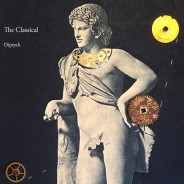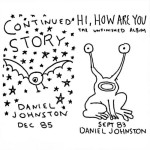 This, the debut album from San Francisco duo The Classical functions, conveniently, as a diptych. On one flat plate is wild free-jazz rock with experimental post-punk noise, forced home by Britt Ciampra‘s entertaining, unpredictable yet measured drum frenzy, while on the other, there are suspenseful, seductive, spine-chilling and magnetising traits of psychedelic trip-hop. Yet it is hinged together by a surprisingly welcoming melody and intriguing songwriting, even if Juliet E.Gordon‘s deviant, explicit, courageously erotic and avant-garde paranoia is an acquired taste.
This, the debut album from San Francisco duo The Classical functions, conveniently, as a diptych. On one flat plate is wild free-jazz rock with experimental post-punk noise, forced home by Britt Ciampra‘s entertaining, unpredictable yet measured drum frenzy, while on the other, there are suspenseful, seductive, spine-chilling and magnetising traits of psychedelic trip-hop. Yet it is hinged together by a surprisingly welcoming melody and intriguing songwriting, even if Juliet E.Gordon‘s deviant, explicit, courageously erotic and avant-garde paranoia is an acquired taste.
In contempt of the fact Diptych’s cover art shows an interest in history, specifically Greek and Roman mythology – further demonstrated on tracks like ‘Byzantine Tango’ – The Classical are clued in to present day promotional techniques. Originally using SoundCloud as a platform to unleash their album on the world, they were subsequently signed up by Californian label Time Sensitive Records, who pride themselves on their attention-to-detail D.I.Y packaging. The Classical also have this detailed approach to their music. Similar in sound to Wildbirds and Peacedrums (minus the blues aspect), Portishead, The Dø and Scott Walker, there’s a method in their madness and its detailed layers are more apparent with every listen.
Purposely placed piano steps and mischievous percussion bring a sense of unease on ‘Shovel and Bevel’, as well as the partnership of Gordon’s disorientated vocals – it’s hard to pinpoint but it’s somewhere between Marianne Faithful, Kate Bush, PJ Harvey , Siouxsie Sioux and Beth Gibbons – with a masculine vocoder accompaniment and sharp shivering cello which attacks the listener like a nervous knife-wielding psychopath.
‘Drive By’‘s sitar is dispatched in a groaning, hiccupping fashion, and ‘Escapeboards Part I’ envisions a monster snoring, itself reminiscent of Björk’s ‘Ancestors’.
‘Byzantine Tango’ incorporates cold vintage piano and synthesizers with folk humming, while ‘Younger Days’ features that comical onomatopoeia sound from the sixties Batman television series. ‘Deft With Language’ repeats an inventive pattern of three elements: a non-lexical rippling voice, simple echoed piano keys and bashed drums with a glossy reverb, interrupted occasionally by ghostly synth wave. This could possibly be an education in minimalistic and efficient composition.
Diptych is mixed by Jay Pellicci, who brings the impulsive nature of fellow San Fransiscans Deerhoof with him, as well as their fondness for social commentary. In the music promo for lead single ‘Shovel and Bevel’, Gordon portrays a narcissistic, greedy corporate head aiming to dominate the world through the power of Facebook “likes”. It’s not only a satirical, societal warning but also humorously ironic considering The Classical’s inevitable cult status – think of them as a having a Barbican/Royal Festival Hall type audience.
Gordon’s experience as a stage actress will be beneficial in promo videos but she is equally persuasive, expressive and convincing in her vocal delivery and assertive nature within the music alone. She confronts the listener with genuine domination on ‘Shovel and Bovel’ with a narrative that could belong to a revenge/slasher flick: “Shifting the blame to sister, somebody should tell her how you fixed her. I’ll get you. I’ll get you on both sides.”
However this isn’t particularly striking when you compare it to Gordon’s controversial perspective on Sicily: Catacombs, which shows the limitless boundaries of her songwriting. She challenges the existence of a famous Italian crypt that allows the public to view embalmed corpses, comparing the victims’ deaths metaphorically to a spider’s web. She questions the mentality of visitors who wish to take photos of themselves with the deceased – today’s obsession with capturing any moment – and even shockingly associates necrophilia with this activity – although like a lot of the album, this can be easily be misinterpreted.
‘The Blue Room’ could be a reference to a play by David Hare – demonstrating Gordon’s affiliation with the acting scene – that follows a series of sexual and intimate encounters and once featured Nicole Kidman in a lead role. It continues Gordon’s demanding prose but also matches this with a level of desperation and vulnerability.
It is sometimes easy to forget that these are just characters presented within the surrealistic stage of her mind but ‘Our Lady Revenge’ perhaps emphasises the most fantastical separation from normal society, as the narrator becomes infatuated with a monster in the most perverse fashion. It feels like it has no specific time, place or setting like an unexplainable dream, whereas ‘Escapeboards Part I’,’ Driveby’ and ‘Younger Days’ are mercilessly cryptic with some fearless and possibly offensive choice of words. It all contributes to the duo’s unashamedly mysterious and otherworldly personality.
‘Diptych’ will terrorize and stalk you long after the its competition, and hypnotize you to listen again and again. Not many albums from the Bay Area have that kind of power.
[Rating:4]



